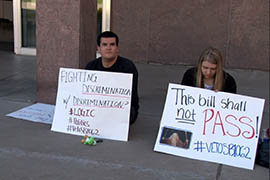Cronkite News has moved to a new home at cronkitenews.azpbs.org. Use this site to search archives from 2011 to May 2015. You can search the new site for current stories.
Economic arguments against religious-freedom bill point to immigration law
PHOENIX – With business leaders calling on Gov. Jan Brewer to veto religious-freedom legislation that opponents say would sanction discrimination against gays, Phoenix Mayor Greg Stanton said Monday that fallout from SB 1070 may serve as a guide.
“We don’t want any more self-inflicted wounds,” he said.
Stanton said SB 1062, narrowly approved last week by the Legislature, sends the wrong message to the country and world.
“If this bill becomes law, I do believe we’ll see a negative impact on our economy,” he said. “We’ve seen this before.”
SB 1070, which Brewer signed into law in 2010, caused a sharp outcry around the nation and in Mexico. The economic damage included canceled conventions and business meetings.
“If you put this on the heels of 1070, it paints Arizona as not very attractive to some folks,” said Rick Kidder, president and CEO of the Scottsdale Chamber of Commerce. “It’s riding on the veto.”
His and several other chambers of commerce reported receiving calls and emails from prospective out-of-state tourists saying they were canceling trips because of the legislation.
The Arizona Chamber of Commerce and Industry sent Brewer a joint letter on behalf of itself and several other business groups urging a veto.
“The legislation is also already clearly having a negative effect on our tourism industry, one of the largest sectors of the economy,” the letter said. “The bill could also harm job creation efforts and our ability to attract and retain talent.”
Brewer has until the end of the week to sign the bill, veto it or allow it to become law without her signature.
As national news organizations have picked up the story, Arizona is developing an image problem, said Dennis Hoffman, a professor of economics at Arizona State University’s W.P. Carey School of Business. That could result in employers and employees refusing to come to the state and conventions shying away from the state’s politics.
“Conventions fill our hotels and our restaurants and bars, and they do so during the times of the year when the places are a bit more idle,” he said.
Hoffman added that growing sectors of Arizona’s economy such as technology, aerospace and defense manufacturing, as well as advanced product manufacturing firms like Apple, require highly skilled workers who may be turned off by SB 1062.
“It would seem to me that this sort of legislation is just simply not conducive to attracting those type of folks,” Hoffman said.
Steven Zylstra, president and CEO of the Arizona Technology Council, said that if the bill becomes law it would hurt the state’s efforts to lure companies.
“It will have an impact on our ability to attract talent,” he said. “And it will have an impact on our ability to attract capital.”
The Arizona Technology Council, along with 83 other businesses, trade associations and other organizations including AT&T, the Scottsdale Convention and Visitors Bureau and Local First Arizona, sent Brewer a letter Monday urging a veto.
“This will haunt our business community for decades to come,” the letter said.







